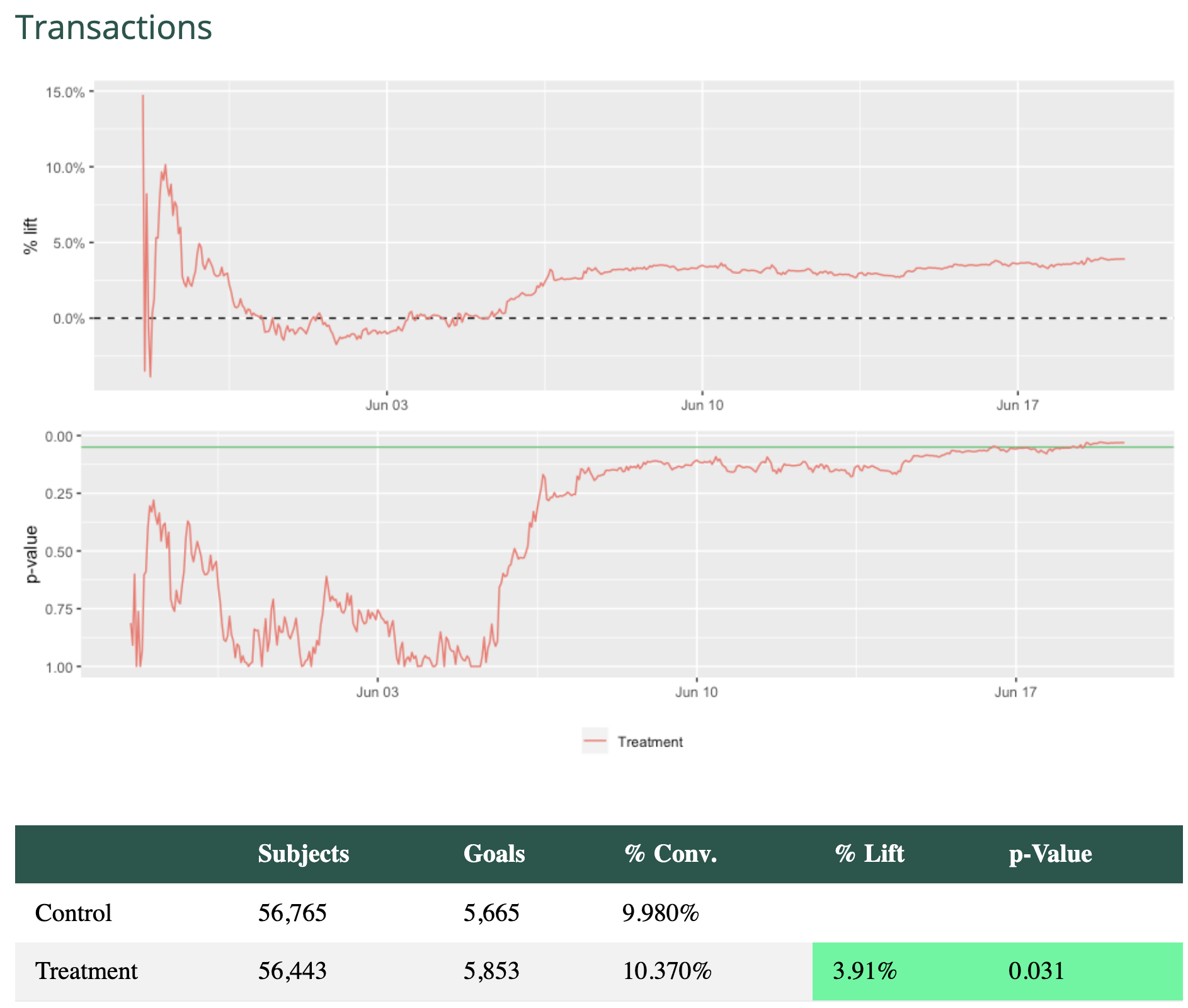Mojito framework overview

Mojito is a modular, source-controlled split testing framework that lets you build, launch and analyse experiments via Git/CI.
It is comprised of 3 core modules that can be used independently of each other or in unison:
- Mojito JS Delivery: Run experiments on your site through JS. (Github)
- Mojito Snowplow Storage: Events & data models for tracking into Snowplow Analytics. (Github)
- Mojito R Analytics: Templatable RMarkdown experiment reports. (Github)

Features#
- ~5.5kb minified & gzipped
- Define experiments with simple JS or YAML
- Self-hosted & git-controlled for familiar code review / merging
- Expressive trigger system & utilities
- Variant code (JS/CSS) minification & linting
- Track and handle JS errors caused by your variant code
Mojito vs. [vendor]#
Differentiating features between popular vendors' tools and Mojito out of the box:
| Feature | Optimizely X | Google Optimize | Mojito |
|---|---|---|---|
| Open-source license | ❌ | ❌ | ✅ BSD3 |
| Light front-end codebase | ❌~80kb* | ❗~25kb* | ✅~5.5kb^ |
| Git source control & CI | ❌ | ❌ | ✅ |
| Variant error-tracking/handling | ❌ | ❌ | ✅ |
| Auto CSS/JS minification | ❗(not custom code) | ❓ | ✅ |
| Self-hosted | ❗ (for a fee) | ❗(via API) | ✅ |
| Data ownership | ❗(via S3 export) | ❗(via 360/BigQuery) | ✅ |
| Retroactively add new metrics | ✅ | ❗(360 only) | ✅ |
| Server-side/App testing | ✅ | ❗(via API) | ❗(via Storage) |
| WYSIWYG test editor | ✅ | ✅ | ❌ |
* Tested 2019-07-05, ^ Tested 2020-05-18
Getting started#
Mojito consists of three components, which are often switched out in the course of Mint Metrics' client services:
- Delivery: Front-end libraries to reliably control which treatments users are exposed to. e.g. Mojito JS Delivery
- Storage: Data collection modules and data modelling steps to power your reports. e.g. Mojito Snowplow Storage
- Analytics: Tools to measure & report on the effects caused by your treatments. e.g. Mojito R Analytics
Get up and running quickly with the README files inside each section.
Example experiment#
Using Mojito's CI tools, you can set up experiments in YAML & JS:
id: ex1name: Example test 1state: livesampleRate: 0.75trigger: trigger.jsrecipes: 0: name: Original 1: name: Variant js: variant.js css: variant.css
Where trigger.js activates the experiment when a condition is met and a callback to activate is fired:
function trigger(test) { if (document.location.pathname === '/') test.activate();}
Upon activation, the will include 75% of traffic (sampleRate: 0.75) and split it 50-50 between "Original" and "Variant" groups.
For users assigned to the "Variant" group, we execute a) variant.js and b) variant.css files to transform the page through a a) JS function and b) CSS stylesheet respectively.
After you've defined an experiment YAML...#
Run the Gulp pipeline to lint/test/publish your container.
- Install the necessary NPM packages:
npm install - Build & publish your testing container:
gulp build && gulp publish
Example analytics reports#
If you use our Snowplow/Redshift & R Analytics component for reporting, all your metrics can be reported on with a simple array of metrics.
wave_params <- list( client_id = "mintmetrics", wave_id = "ex1", start_date = "2019-05-15 09:19:45", stop_date = "2019-06-05 14:29:00", time_grain = "hours", subject = "usercookie", recipes = c("Original", "Variant"))
goalList <- list( list( title = "Transactions", goal = "purchase", operand = "=" ), list( title = "Thankyou page views", goal = "page_view /contact/thank-you%", operand = "like" ))goalList <- mojitoFullKnit(wave_params, goal_list = goalList)
For this experiment, we'll report on transactions and page views:

Support for other analytics back-ends#
You don't exactly need Snowplow Analytics to use Mojito. You can also track experiments to wherever you like, via a custom storage adapter. E.g. To Google Tag Manager, Adobe etc.
You can even hook Mojito Delivery up to Google Optimize's reports for free.
Server-side and app split testing libraries#
Currently we support only front-end JavaScript experimentation through our Delivery module. Until we build out SDKs for apps and server-side code, our support for experiments on these platforms is through our Storage and Analytics components.
Using modules independently#
The modular structure makes it easy to use components of Mojito independently of one another. We often use Mojito components individually when:
- Existing SaaS tool like Optimizely, VWO or Convert.com is implemented as a Delivery mechanism: Track experiments into Storage and Analytics reports
- Existing Storage target and Analytics reports, such as Google Optimize are being used: Build and launch experiments from Git/CI with Mojito's JS split testing library
Credits#
Our Delivery JS library is a heavily modified fork of the excellent jamesyu/cohorts lib. Meanwhile we employ heavy use of the Snowplow Analytics event pipeline for our Storage component and RStudio/Knitr for our Analytics reports.
Getting involved#
We would love to see PRs! We're able to assist if you hit any snags getting set up.
Reach out to us via: